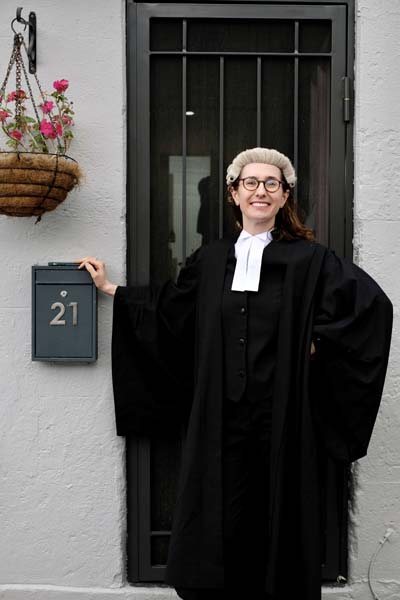The class of lockdown: How the Bar Practice Course went online

The challenges of the 2020 Bar Practice Course, in hindsight, were little compared to what Bali Kaur (Director, Professional Development) and her team would face in 2021. Things had returned to normality for the May 2021 course, which was run entirely in person. But when Sydney went into lockdown at the end of June 2021 and the case numbers continued to climb, the team had to make decisions about if, and how, they would run the course.

Initially, Ms Kaur recalls, it seemed the course might be able to be run in a hybrid online and face-to-face format, as occurred in September 2020. As time went on, that became increasingly unlikely. A decision was made, taking into consideration the safety of the readers, presenters and Bar Association staff, to run the course entirely online.

A year ago, this seemed impossible. The May 2020 Bar Practice Course, in the first COVID-19 lockdown, had been cancelled entirely. But with a year under their belt, the team was able to quickly adapt to a fully online delivery model. In the end, the course ran to completion with all court sessions and the final Mock Trials undertaken entirely online.
'It was fortuitous that this course was smaller than usual, with only 36 new readers joining the bar in September 2021. The smaller number made it all a bit more manageable. Having more than this number of readers would make an entirely online course almost impossible from a practical perspective, with the current resourcing. It could certainly be done with a larger team staffing the course,' says Ms Kaur.
As for technical problems, Ms Kaur says the presenters, readers and judges were used to dealing with Zoom and other online formats. 'Most people now realise what to do. The judges were all good with the technology,' recalls Ms Kaur.
The course used Zoom for nearly everything: presentations, lectures and the advocacy sessions. There were occasionally difficulties when logging on to the court systems for practice sessions with volunteer judges, 'but', Ms Kaur says, 'this made it more realistic for the readers. They encountered the technological problems that practitioners are experiencing and dealing with every day in real life'.
The team adjusted the format and content of the course, building in more breaks to alleviate the fatigue common to concentrating on a screen for extended periods. The readers had sessions on technology in the courtroom and occupational health and well-being, to recognise and help deal with the challenges facing practitioners during the pandemic.
There is one last session for the readers to complete, which will be in person when possible. The readers will spend one day (hopefully before the end of 2021) having real 'in court' advocacy experience. Ms Kaur says it is important for the group to be able to get together and meet each other in person, as well as experience the physical courtroom.
As to whether Zoom classes and advocacy sessions are the future of the Bar Practice Course, that is yet to be decided. Ms Kaur says there are certainly aspects of the course that preferably should be run traditionally and in-person, including the advocacy sessions, workshops and collaborative lectures. However, for lecture style presentations, having them delivered online may be desirable. 'There are equity benefits for people who are from the regions in running at least parts of the course online. Usually, people coming from the regions (including the ACT) have an added expense of staying in Sydney for a month. The readers did not have this added burden for this Bar Practice Course'.
As for the readers, the informal feedback received has been overwhelmingly positive. 'They were a lovely group, and seemed just so appreciative that we were running the course, given the circumstances,' says Ms Kaur.
Reflections from readers

When I found out the course would be purely online, I was initially disappointed. But having done the course, I think there is a real advantage in that we know at least some form of AVL hearings will be around for a while. This cohort of readers certainly doesn’t have any concern or predisposition against appearing online.
The advocacy exercises were completed online, and all ran as normally as any AVL hearing does. I found the cross-examination of witnesses interesting, as it was more challenging trying to read reactions through a screen. The whole final mock trial was completed online.
Starting at the Bar during lockdown has been difficult, but made easier by the support of tutors. Even though they are working from home, both of my tutors have made a proactive effort to stay in touch. My floor has also been very supportive, with senior members providing opportunities to be in hearings and get reading days done.
The highlight of the course for me was the bonding between the course members. Even though we couldn’t meet together in person, in some ways I think the dislocation brought people closer than usual. There was a broader friendship across the whole course. We had a very active Whatsapp group throughout the course which has remained active in the first few weeks of practice.
The most challenging part of the course was the very first advocacy exercise: an application before a magistrate. But it got easier as the days went on. Ultimately, I now feel grateful that we were able to do the course at all, in such a challenging time for everyone.

I am very grateful that the Bar Association pulled together to ensure that a Bar Practice Course could go ahead. I felt very lucky that notwithstanding the traditional nature of our profession, the Bar Association moved as much as possible to ensure that we could do the course.
As a reader from a regional area, there was a real advantage in doing the course online, as it was less of a financial burden than also having to stay in Sydney for a month. Of course, there are downsides to the online model, as it can be hard to maintain focus after a long day in front of a screen, and there are no social events to look forward to with the cohort.
The advocacy part of the course was a real positive, because in many ways, this might be the future of advocacy. I feel lucky to have had the opportunity to practise advocacy — especially online advocacy — in front of various senior members of the Bar and judicial officers. That being said, I think I will always prefer advocacy in person and I hope we do eventually go back to 'normal'.
The most challenging part of the course was the civil aspect: coming from a criminal law background, there were many tasks that were relatively unfamiliar to me, like drafting pleadings and affidavits. But by the end of the course there was such a strong collegiate atmosphere that I could ask anyone in the group for assistance if I needed it.
The highlight of the course for me was finishing, which is not to say the course itself was not enjoyable. But it was a big effort to get to the end, and the whole cohort was quite proud to get to the last day. We set up a Zoom drinks to celebrate at the end, and spent some time chatting and debriefing.

My experience of the Bar Practice Course was overwhelmingly positive. The course was well organised and ran as smoothly as could be expected in the circumstances.
As I was already working from home before the course started, I did not notice a major change having to attend the course entirely online. While I did find being on Zoom for consecutive long days quite tiring, there were some benefits in having the course online. These included not having any travel time commuting into the city each day and having more time with my toddler at home.
Some of the disadvantages of having a fully online course included missing out on social interaction with the other readers and presenters, and not having advocacy opportunities in an actual courtroom. While the presenters were excellent, and offered some great online advocacy tips, I felt that having a chance to practise advocacy in a face-to-face mock trial would be preferable. I am looking forward to the planned in-person advocacy day before the end of the year (which I understand the Bar Association is arranging).
Another downside of a fully online course was that we were not able to have a photo taken of all the readers in wigs and gowns on the last day of the course. Our Zoom screenshot is not quite as impressive!